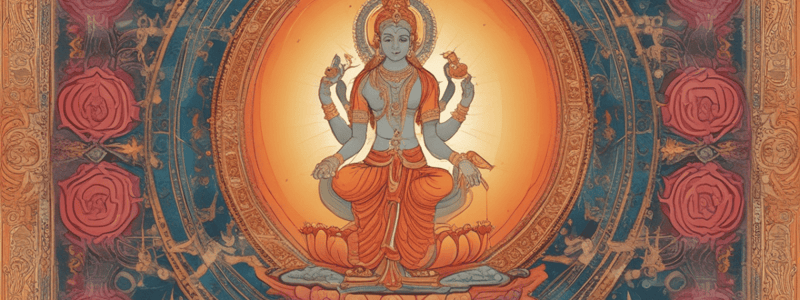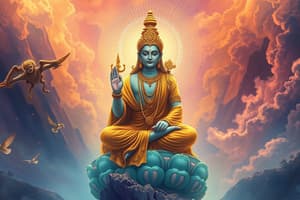Podcast
Questions and Answers
Hinduism is considered a polytheistic religion because it worships 330 million gods.
Hinduism is considered a polytheistic religion because it worships 330 million gods.
False (B)
Hindus believe that the 330 million deities are separate and independent from each other.
Hindus believe that the 330 million deities are separate and independent from each other.
False (B)
The concept of Brahman is a recent development in Hinduism.
The concept of Brahman is a recent development in Hinduism.
False (B)
Hindus believe that reality is multiple and fragmented.
Hindus believe that reality is multiple and fragmented.
The story of the 93-year-old man who documented 330 million deities is a myth.
The story of the 93-year-old man who documented 330 million deities is a myth.
Brahman is described as changing and finite in Hindu scriptures.
Brahman is described as changing and finite in Hindu scriptures.
The concept of Trimurti in Hinduism involves three main deities: Brahma, Vishnu, and Shiva.
The concept of Trimurti in Hinduism involves three main deities: Brahma, Vishnu, and Shiva.
Brahma and Brahman are the same entity in Hindu belief.
Brahma and Brahman are the same entity in Hindu belief.
Hindus believe in many gods but consider there to be one essence behind those deities.
Hindus believe in many gods but consider there to be one essence behind those deities.
The Puranas claim that Vishnu was created by Shiva.
The Puranas claim that Vishnu was created by Shiva.
Flashcards are hidden until you start studying
Study Notes
Hindu Concept of the Sacred
- Hinduism is both theistic (believes in deities) and monistic (believes in one ultimate source)
- This concept is often misunderstood, leading to questions about whether Hinduism is monotheistic or polytheistic
- Hinduism can be considered monotheistic because it believes in one supreme God, Brahman
- However, Hindus worship multiple deities, which can be seen as polytheistic
Many Deities, One Essence
- There are approximately 330 million deities in Hinduism
- Despite this, Hindus believe in one supreme God, Brahman, who can be worshiped in many different forms and persons, called avatars
- These forms, known as devas or deities, are not the same as Brahman, but rather different aspects of the one God
- This concept is reflected in the Hindu view of reality, which believes that there is one reality with many different sides and forms
Brahman
- Brahman is the supreme God in Hinduism, considered unchanging and infinite
- Brahman is omnipresent, omnipotent, omniscient, and indescribable
- Brahman is the divine ground of all matter in the universe and beyond
- Brahman is genderless and cannot be seen by the eye
Creation and the Trimurti
- According to ancient Hindu tales, Brahman created Shiva, who then created Vishnu, and from Vishnu's navel, Brahma (not to be confused with Brahman) emerged
- These three deities form the Trimurti, the cosmic function of creation, maintenance, and destruction personified
Studying That Suits You
Use AI to generate personalized quizzes and flashcards to suit your learning preferences.




